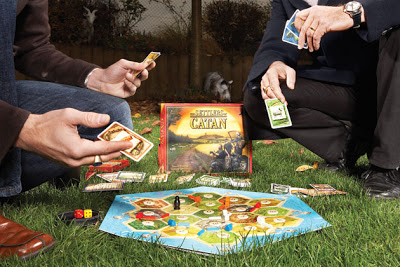
Often called the gateway game of European board games, Settlers of Catan, is also the pioneer of European board games. Wired Magazine does a great job explaining the phenomena back in 2009 with an article titled “Monopoly Killer: Perfect German Board Game Redefines Genre.
To get an idea of how influential Klaus Teuber, creator of Settlers of Catan, read the exerpt below. Its a great indication of how popular these board games are in Germany.
…In 1991, Klaus Teuber was well on his way to becoming one of the planet’s hottest board game designers. Teuber (pronounced “TOY-burr”), a dental technician living with his wife and three kids in a white row house in Rossdorf, Germany, had created a game a few years earlier called Barbarossa and the Riddlemaster, a sort of ur-Cranium in which players mold figures out of modeling clay while their opponents try to guess what the sculptures represent. The game was a hit, and in 1988 it won the Spiel des Jahres prize—German board gaming’s highest honor.
Winning some obscure German award may not sound impressive, but in the board game world the Spiel des Jahres is, in fact, a very, very big deal. Germans, it turns out, are absolutely nuts about board games. More are sold per capita in Germany than anywhere else on earth. The country’s mainstream newspapers review board games alongside movies and books, and the annual Spiel board game convention in Essen draws more than 150,000 fans from all walks of life.
Because of this enthusiasm, board game design has become high art—and big business—in Germany. Any game aficionado will tell you that the best-designed titles in the world come from this country. In fact, the phrase German-style game is now shorthand for a breed of tight, well-designed games that resemble Monopoly the way a Porsche 911 resembles a Chevy Cobalt.
But back in 1991, despite having designed a series of successful German-style titles, Teuber still thought of making board games as a hobby, albeit a lucrative one. “With all the games, we would sell 300,000 the first year and then next to nothing the next,” he says. So Teuber stuck with his day job selling dental bridges and implants, struggling to keep afloat the 60-person business he had inherited from his father. At night he would retreat to his basement workshop and play.
One day Teuber began tinkering with a new theme for a game: an uncharted island. In his original vision, players would slowly discover the island by flipping over tiles, then establish colonies using the indigenous natural resources. The game incorporated elements of other ideas Teuber was working on, but for some reason this one seemed special. “I felt like I was discovering something rather than inventing it,” Teuber says.
Every once in a while, he would bring the new game upstairs to test it out on his family. They would play along, but Teuber could tell that the game wasn’t working. Sometimes, in the middle of a match, he would notice his youngest son, Benny, reading a comic under the table. Other times his wife would suddenly remember a load of laundry that needed immediate attention. After each of these sessions, Teuber would haul the game back downstairs for further refinement. He repeated this process over the course of four years.
Eventually, Teuber whittled his invention down to a standard pair of dice, a handful of colored wooden houses that represented settlements and cities, stacks of cards that stood for resources (brick, wool, wheat, and others), and 19 hexagonal cardboard tiles that were arranged on a table to form the island. He had hit on something with this combination—the enthusiasm on family game night was palpable. During nearly every session, he, his wife, and their children would find themselves in heated competition. The game was done, Teuber decided. He called it Die Siedler von Catan, German for “The Settlers of Catan….”
Find out what happens next at WIRED Magaizine’s webs site.
Dont Forget. If you want European board games in Portland visit us at Off The Charts Games!